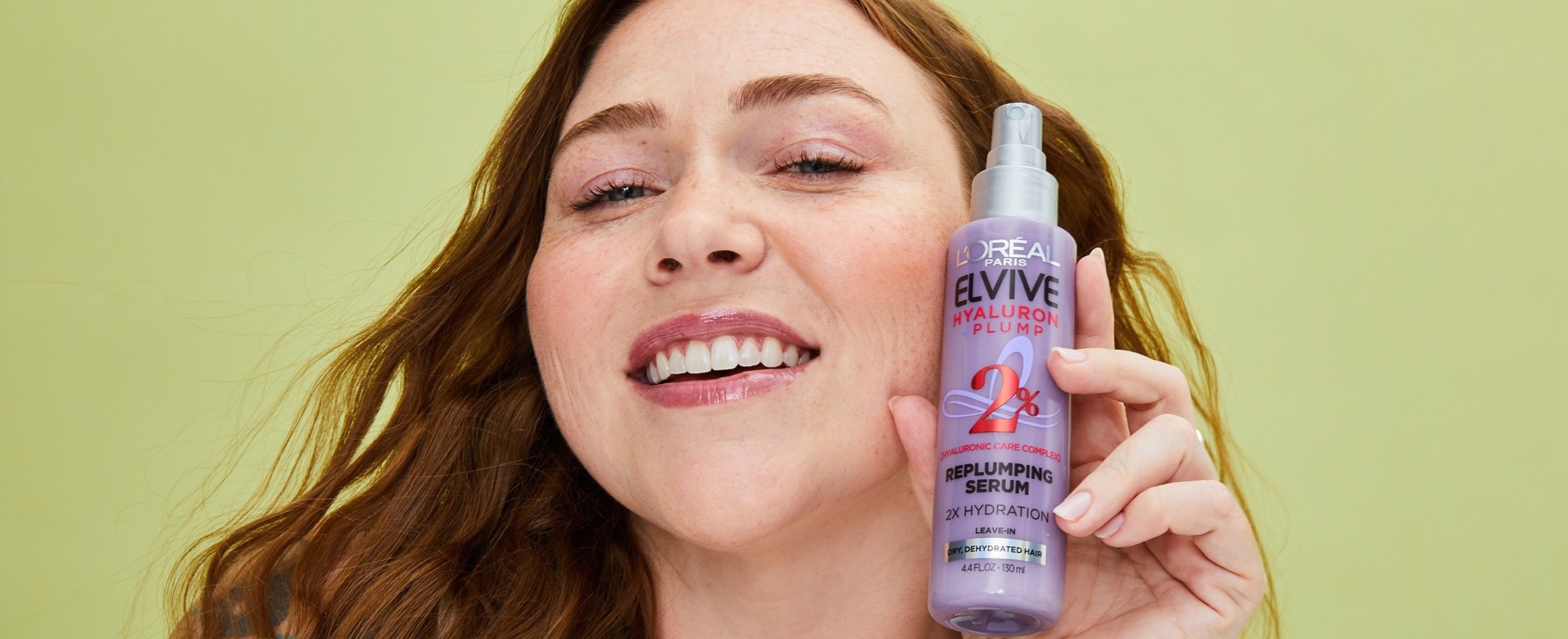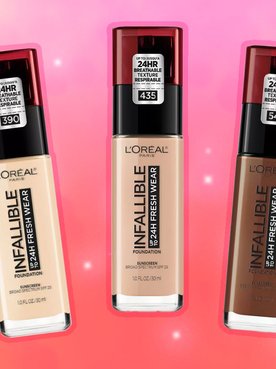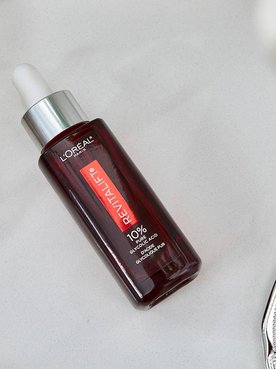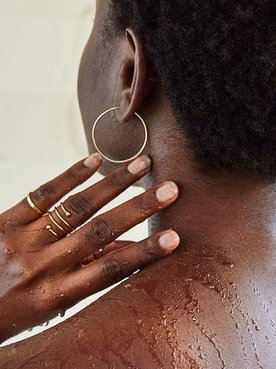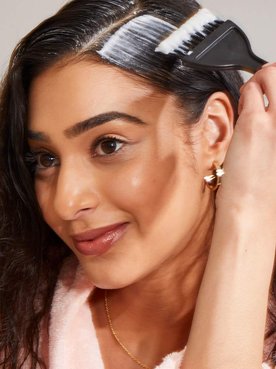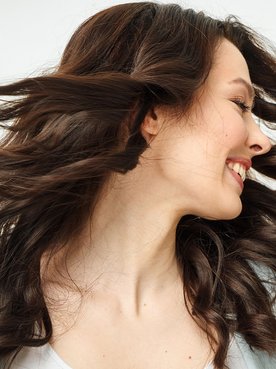It’s safe to say that no one wants dry hair but many deal with it. Brittle hair plagued by breakage and split ends can make your strands harder to style, cause flyaways and even sacrifice length. Unfortunately, it can happen to the best of us after frequent styling, dye sessions, salon treatments and heat use. If you’ve been trying every product and technique for dry hair with no luck, you may actually have dehydrated hair, which requires its own set of nuanced care.
Yes, dry hair and dehydrated hair are two different issues but the good news is, you don’t have to settle for the latter (or the former). There are things you can do and products you can use to help nurse your hair back to health. So, take notes as we share tips and product recommendations to help bring your dehydrated hair back to life.
Featured Products
How Can You Tell If Your Hair Is Dehydrated?
Hair that lacks hydration (a.k.a. dehydrated hair) typically looks dull and feels rough. Additionally, it’s tough to style, extra oily, lacks volume and split ends are much more noticeable. In appearance, it’s very similar to dry hair which is why it can be tough to distinguish between the two.
To help identify if you have dehydrated hair, here are a few things to look for: hair that feels super dry after the wash process, hair that is flat and constantly greasy at the scalp and hair that feels rough to the touch, even after using smoothing products. If any of these struggles ring a bell, you likely have dehydrated hair.
What's the Difference Between Dehydrated Hair and Dry Hair?
It’s so common for people to refer to dehydrated and dry hair interchangeably so it can be confusing to understand that they’re not the same. Dehydrated hair happens when there is a lack of water. Simply put, water is a key nutrient for your hair and when there is a significant lack of it, your strands won’t be able to retain any moisture.
On the flip side, dry hair usually stems from excessive exposure to chemicals (like in relaxers), hair dyes, and heat. Certain hair styling products and overwashing can also cause dryness as they strip away your hair’s natural oils. Overall, dehydrated hair needs water to retain moisture while dry hair needs oil to seal the cuticle and lock in moisture.
How Do You Fix Dehydrated Hair?
With the right products, practices and tips, you can put dehydrated strands in your rearview for good. Check out our six tips for reviving dehydrated strands, below.
1. Use a Hydrating Hair Care System
The key to getting your dehydrated hair back on track is all about boosting your strands with hydration. The easiest way to achieve that is by using a moisturizing hair care system like the L’Oréal Paris Elvive Hyaluron + Plump Hydrating Shampoo, Paraben-Free and the L’Oréal Paris Elvive Hyaluron + Plump Hydrating Conditioner, Paraben-Free.
This duo is formulated with hyaluronic acid to re-plump dry, dehydrated strands while giving your thirsty hair noticeable body, bounce and shine. Hyaluronic acid is a game-changer for dry skin as it helps the skin to retain moisture, so it only makes sense that the same can apply to your hair.
2. Add Reparative Products to Your Hair Care Routine
Adding a hydrating serum to your hair care routine is another way to give your strands some much-needed, long-lasting hydration. The L’Oréal Paris Elvive Hyaluron + Plump Moisture Plump Serum, Paraben-Free is a go-to because it also contains hyaluronic acid to replenish moisture without weigh-down. Spray it all over the length of your hair daily to revive dehydrated strands by adding shine, bounce and volume.
For day-to-day styling, try the L’Oréal Paris EverPure Sulfate-Free 21-in-1 Color Caring Spray, Leave-In. With 21 benefits including moisturizing and detangling hair, controlling frizz and more, it’s a great treat for dehydrated strands while leaving hair light, smooth and refreshed.
3. Protect Your Hair at Night
Regardless of the condition of your strands, you should always try to protect your hair while you sleep. Sleeping on cotton sheets and pillowcases can remove moisture from your hair because cotton is an absorbent material, so consider switching to a silk pillowcase or wrapping your hair with a silk or satin scarf. Silk or satin causes less friction and helps to avoid any damage to your hair while you recharge.
4. Avoid Heat Styling
It can be hard to say no to your hot tools but don’t underestimate what a difference skipping on heat can make. Over-processing can lead to dehydration so opt for heat-free hairstyles like overnight beach waves or a low bun.
For those with curly hair, protective hairstyles can keep your dehydrated strands from getting worse. The L’Oréal Paris Elvive Dream Lengths Super Curls Cream Leave-In is great for creating soft and bouncy natural curls with no weigh-down and includes nourishing ingredients such as sunflower seed oil.
Editor’s tip: When you have to use hot tools, make sure to prime your strands with a heat protectant like the L’Oréal Paris Elvive Dream Lengths Frizz Killer Serum Leave-In or the L’Oréal Paris EverPure Sulfate-Free Weightless Blow Dry Primer, Heat Protectant. Another tip is to use your hot tools on the lowest temperature setting while only passing through each section of hair once if possible.
5. Use a Deep Conditioning Treatment
When working with dehydrated hair, you’ll want to add a deep conditioner to your routine as they go the extra mile to help provide your hair with nourishment and result in soft, moisturized strands. We recommend the L’Oréal Paris EverPure Sulfate-Free Signature Masque, Color Care Hair Mask, which works for all hair types, providing deep hydration and enhancing shine while leaving you with noticeably healthier-looking strands.
6. Get Routine Trims
If your dehydrated hair is suffering from split ends and damage, a routine trim is the best way to remove the dead ends and prevent breakage. If you dread haircuts, try a hair dusting as they remove only the dead parts of your hair, meaning you don’t have to sacrifice on length every time you get a haircut. When your ends are healthy, the products and techniques you use to revive your dehydrated strands will seemingly start to work better.
Next: How to Use Conditioner the Right Way
Edited by: Reece Andavolgyi, Photographer: Chaunte Vaughn, Art Director: Hannah Packer, Associate Creative Producer: Becca Solovay, Digital Tech: Paul Yem, Photo Assistant: Matt Licari, Makeup Artist: Jonet Williamson, Hair Stylist: Akihisa Yamaguchi, Wardrobe Stylist: Alexis Badiyi, Wardrobe Assistant: Jazmine Alzado, Model: Shann Hitch
